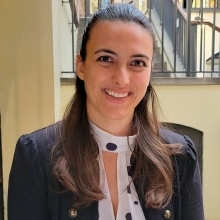How do you study things you can’t see? ARCS Scholar Alexandra Hanselman is working towards her PhD at the University of Chicago and uses physics tools to study gravitational waves and black holes. She simulates theoretical black hole images using Albert Einstein’s theory of relativity.
“A black hole is an astronomical object so massive not even light can escape its gravitational pull. Because of this, any light we see from a black hole image comes from an accretion disk – made up of gas, plasma, or dust so hot that it radiates light – that surrounds the black hole. Simulating black hole images can be computationally expensive when using complex physics like general relativistic magneto-hydrodynamics,” Hanselman explains.
Her project instead uses phenomenological characteristics, such as a simple two-parameter toy model, for the brightness of the accretion disk to make the simulations computationally cheap.
Her undergraduate and graduate research has focused on both the experimental and theoretical sides of gravitational waves and black hole research. She gained experience at the Massachusetts Institute of Technology in the LIGO lab (Laser Interferometer Gravitation-Wave Observatory). “Our lab researched how to reduce the quantum noise in the detector using squeezed states of light,” Hanselman explains.
Another summer, she was at the Gravitational Astrophysics Lab at NASA’s Goddard Space Flight Center, working on instrumentation and analytics for a mission currently planned to launch in the 2030s. This project will use a space-based telescope to observe gravitational waves using an interferometer between three spacecraft.
“In short, gravitational waves are ripples in spacetime from merging compact objects such as black holes and neutron stars that certain observatories like LIGO, Virgo, and Kagra can measure,” she says.
At the University of Chicago, with Daniel Holz’s relativity lab, Hanselman explored different fields of general relativity. In addition to her abovementioned project, Hanselman recently completed a project investigating the different eccentricity definitions between those used in gravitational waveforms and those used in the astrophysics community. These discrepancies have implications for inferring what types of astrophysical environments form compact objects, such as black holes.
“Astronomy helps us learn about the objects in our universe, like stars, black holes, and everything in between. We can look at the millions of stars in our universe to learn how our star, the Sun, will evolve over time,” Hanselman continues. “Cosmology helps us learn about the universe’s past, which can hint at what’s to come in our universe’s future.”
She says her career goal “is to make an impact in the world through science.” Hanselman says that the ARCS Scholar Award has enabled her to spend more time on her studies and research of the universe.

